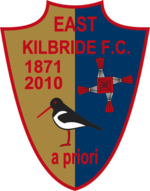East Kilbride F.C.
 |
|
| Full name | East Kilbride Football Club |
|---|---|
| Nickname(s) | The Kilby, EK |
| Founded | May 2010 |
| Ground | K-Park Training Academy, Calderglen Country Park, East Kilbride |
| Capacity | 660 (400 seated) |
| Chairman | Mark Horner |
| Manager | Billy Stark |
| League | Lowland League |
| 2016–17 | Lowland League, 1st (champions) |
| Website | Club home page |
East Kilbride Football Club is a semi-professional football club based in East Kilbride, South Lanarkshire, Scotland. They are members of the Lowland Football League, in the fifth tier of the Scottish football league system. Formed in 2010 with the intention of bringing senior football to one of Scotland's largest towns, the club initially competed in amateur football before becoming one of the founder members of the Lowland League in 2013. The club became a full member of the Scottish Football Association (SFA) in 2014, entitling them to automatic entry to the Scottish Cup. In 2016 they broke the most wins in a row record held by AFC Ajax before losing after 30 consecutive wins.
The club were launched officially by two former Old Firm players, John Hartson and John Brown, of Celtic and Rangers respectively. The club was resurrected after folding in the 19th century, having being launched in 1871.
The original club was formed in 1871, making it one of the oldest clubs in Scotland. The first office bearers included the quaintly titled Croupier, which today would be recognised as Treasurer. The first recorded match was a 1–0 defeat by a Queen's Park second eleven in April 1872. They drew 0–0 with the same team later that year. During the 1870s the club folded and resurrected several times, which was a regular occurrence at that time for football clubs. The original club colours were navy and gold according to evidence from the SFA Museum of Football. The original club did not have a badge, which was customary at the time too. The team played at Kirktonholme in 1876, winning three, losing nine and drawing three games. The team played at Show Park in 1877 and had a better season, winning six, losing six and drawing six. The club participated in some of the earliest editions of the Scottish Cup in seasons 1878–79 and 1879–80, going out in the first round in both seasons.
...
Wikipedia
